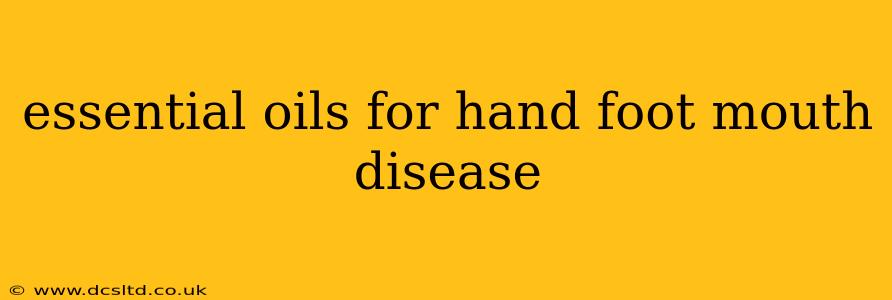Hand, foot, and mouth disease (HFMD) is a common viral infection, primarily affecting young children. While there's no cure for HFMD, managing symptoms and promoting comfort is crucial. Many parents explore complementary therapies alongside medical advice, and essential oils are among those options. It's vital to understand that essential oils are not a replacement for medical treatment and should never be used as a primary treatment for HFMD. Always consult your pediatrician or healthcare provider before using essential oils, especially on young children.
This article explores the potential benefits of certain essential oils in managing HFMD symptoms, clarifying their uses and limitations. We'll address common questions surrounding their application.
Are Essential Oils Effective Against Hand, Foot, and Mouth Disease?
While essential oils themselves cannot cure HFMD, some possess properties that may help alleviate associated symptoms. They are not a substitute for medical care but may offer supportive relief. The effectiveness varies, and individual responses differ significantly.
Which Essential Oils Might Help with HFMD Symptoms?
Several essential oils are often mentioned in relation to HFMD symptom management. However, scientific evidence supporting their efficacy is limited. These oils should only be used topically and in highly diluted forms, ideally under the guidance of an aromatherapist experienced in pediatric care.
-
Tea Tree Oil: Known for its antimicrobial properties, tea tree oil might help reduce the bacterial load associated with secondary skin infections, a potential complication of HFMD. However, it's crucial to use it in a highly diluted form, as undiluted tea tree oil can be irritating and even toxic. Always dilute it with a carrier oil like coconut or jojoba oil before application.
-
Lavender Oil: This oil is often used for its calming and soothing properties. The calming effect can be beneficial for both the child and parents dealing with the discomfort of HFMD. Lavender oil can be diffused in the air to create a relaxing atmosphere.
-
Eucalyptus Oil: Some believe eucalyptus oil can help with congestion and respiratory symptoms if HFMD also presents with cold-like symptoms. Again, always dilute significantly before topical use, and avoid use around the mouth or nose of young children. Diffusion is generally preferred for respiratory issues.
Can I Use Essential Oils Directly on the Blisters?
No, never apply undiluted essential oils directly to blisters or sores. This can cause irritation, burning, and potentially worsen the condition. Always use a carrier oil (such as coconut, jojoba, or olive oil) to dilute essential oils to a safe concentration before topical application. Even then, it’s vital to test a small area first for any allergic reaction.
How Should I Use Essential Oils for HFMD?
The safest method is often diffusion, which involves using a diffuser to disperse the oil's aromatic compounds into the air. This can help create a calming and potentially beneficial environment. For topical use, only use extremely diluted solutions with a carrier oil. Always perform a patch test before widespread application.
What Are the Potential Risks of Using Essential Oils for HFMD?
- Allergic reactions: Some individuals are allergic to certain essential oils. Always conduct a patch test before using any new oil.
- Skin irritation: Essential oils can irritate the skin, especially if used undiluted or in high concentrations.
- Toxicity: Some essential oils are toxic if ingested. Keep essential oils out of reach of children.
- Interactions with medications: Essential oils may interact with certain medications. Consult your doctor before using essential oils if your child is taking any medications.
Are there any other ways to manage HFMD symptoms?
While essential oils might offer some symptom relief, managing HFMD primarily involves supportive care:
- Keeping the child hydrated: Encourage frequent sips of fluids.
- Pain relief: Over-the-counter pain relievers (like acetaminophen or ibuprofen) may help reduce fever and discomfort, always following the dosage recommendations for the child's age and weight.
- Good hygiene: Frequent handwashing can help prevent the spread of the virus.
- Rest: Plenty of rest is essential for recovery.
Disclaimer: This information is for educational purposes only and does not constitute medical advice. Always consult a healthcare professional before using essential oils or any other complementary therapy to treat HFMD or any other medical condition. The use of essential oils for HFMD is not scientifically proven, and their use should be considered a complementary, not primary, approach.
